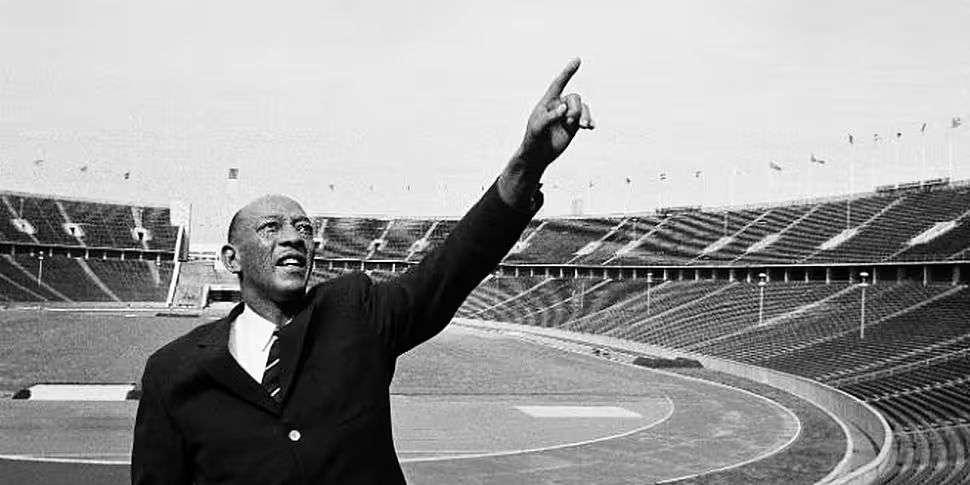One of the lasting images from the 1968 Olympics is the black power salute of John Carlos and Tommie Smith.
At the height of the Civil Rights movement in the US, it was one of many protests by athletes about issues of racism and discrimination in America and had continued a previous tradition exemplified in different ways by the likes of boxer Jack Johnson and athlete Jesse Owens.
On tonight's Off The Ball, amid the backdrop of renewed tensions following the shootings of African Americans by members of law enforcement and the subsequent murder of police officers in Dallas, the show wanted to explore whether current athletes have carried the spirit of protest from the past?
So, Dr Harry Edwards, a Professor Emeritus of Sociology at the University of California, Berkeley, joined Ger on the line to discuss the wider issue as well as the curious case of Jesse Owens.
"There is a long history of struggle but the thing you have to recognise is that every generation of athletes fights those struggles within the context of their own time. Today you have athletes talking about strikes and one thing or another, some have even floated the notion of a boycott of the 2016 Olympics as a consequence of these [recent] killings but they're circumstantial. They're different to the circumstances of the '90s," he said.

The U.S. men's Olympic basketball team player Carmelo Anthony greets children that participated in a basketball clinic as he arrives for a news conference Monday, June 27, 2016, in New York. (AP Photo/Mary Altaffer)
"We have athletes who are truly walking corporations and if Lebron James, Steph Curry, Serena Williams and Carmelo Anthony and some of these other great players walked into a mayor's office or governor's office and said 'we want something done about these killings', whether it's the killing of young black men and women or children or whether it's the killing of police officers, there's no way that that governor or that mayor tells that group of athletes to get lost. We couldn't have done that in the '90s. We didn't have that kind of power. So every generation fights these struggles within the context of their own times and I'm very proud of the way that these athletes today are comporting themselves and beginning to stand up and speak out."
The aforementioned NBA star Carmelo Anthony has called on his "fellow athletes to stand up and do more" in a piece published in The Guardian.
Edwards also spoke to Ger about his own role in bringing about the black power salute that Carlos and Smith performed in 1968 and what is not so well known is that Jesse Owens tried to prevent the salute from occurring despite his own symbolic status in the world of anti-racism via his performance at the 1936 Olympics in Nazi Germany.

Extending gloved hands skyward in racial protest, U.S. athletes Tommie Smith, center, and John Carlos stare downward during the playing of the Star Spangled Banner after Smith received the gold and Carlos the bronze for the 200 meter run at the Summer Olympic Games in Mexico City on Oct. 16, 1968. Australian silver medalist Peter Norman is at left. (AP Photo/FILE)
"Jesse Owens had a curious history. People forget that from 1966-1968, I was a student of sport in society. I was writing my dissertation," said Edwards.
"I had studied Jesse Owens' history and I found it amazing that in 1936, Jesse Owens was one of the leading black athletes voices pushing for a boycott of the 1936 Games as a consequence of what Hitler and the Nazis were doing to minorities inside of Germany.
"So when Jesse Owens was sent in by the United States Olympic Committee to discourage - or threaten - athletes who might do anything demonstrable against racism and discrimination and the killings taking place of black people in America - including the assassination of Dr Martin Luther King - I found that a curious turn of events for a man who in 1936 initially was one of the forces trying to organise an athletes boycott of the 1936 Olympics. And some of the things that he said or was compelled to say were so contradictory. I mean, one of the things that he said was 'If you guys demonstrate or do anything that would tend to be perceived as embarrassing the United States or the United States Olympic team, you won't be able to get a job when you get back home' and I think it was Carlos who stood up and said 'Jesse, what are you talking about? I can't get a job now.' It was the kind of thing that he was almost oppressed into and I think that ultimately he regretted."
Edwards discusses some of the context behind Owens' change of views and the parallel with OJ Simpson in the full interview with Ger.
Download the brand new GoLoud App in the Play Store & App Store right now! We've got you covered!
Subscribe to OffTheBall's YouTube channel for more videos, like us on Facebook or follow us on Twitter for the latest sporting news and content.








